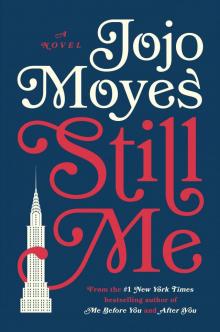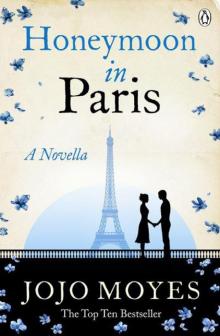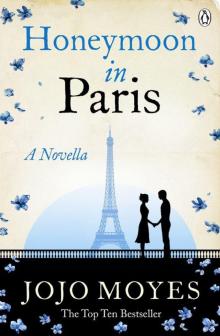- Home
- Jojo Moyes
The Giver of Stars
The Giver of Stars Read online
ALSO BY JOJO MOYES
Still Me
Paris for One and Other Stories
After You
One Plus One
The Girl You Left Behind
Me Before You
The Last Letter from Your Lover
The Horse Dancer
Silver Bay
The Ship of Brides
The Peacock Emporium
VIKING
An imprint of Penguin Random House LLC
penguinrandomhouse.com
Copyright © 2019 by Jojo’s Mojo Limited
Simultaneously published in hardcover in Great Britain by Michael Joseph, an imprint of Penguin Books, a division of Penguin Random House, Ltd., London.
Penguin supports copyright. Copyright fuels creativity, encourages diverse voices, promotes free speech, and creates a vibrant culture. Thank you for buying an authorized edition of this book and for complying with copyright laws by not reproducing, scanning, or distributing any part of it in any form without permission. You are supporting writers and allowing Penguin to continue to publish books for every reader.
Grateful acknowledgment is made to the following for permission to reprint previously published material:
Excerpt from the September/October 1937 issue of The Furrow used with permission of John Deere’s The Furrow magazine. All worldwide rights reserved.
Excerpt from “Introduction” by John C. Hennen, copyright © 2008 by John C. Hennen. Originally published in Harlan Miner Speaks: Report on Terrorism in the Kentucky Coal Fields by the University Press of Kentucky. Reprinted with permission of the University Press of Kentucky.
Excerpt from “‘To Have, Hold, Develop, and Defend’: Natural Rights and the Movement to Abolish Strip Mining in Eastern Kentucky” as published in the Journal of Appalachian Studies Vol. 11, No. 1/2 by Chad Montrie, (https://www.jstor.org/stable/41446655). Used with permission of the author.
Excerpts from the WPA Guide to Kentucky edited by F. Kevin Simon copyright © 1939 by the University of Kentucky, reprinted with permission of University Press of Kentucky.
A Pamela Dorman Book/Viking
LIBRARY OF CONGRESS CATALOGING-IN-PUBLICATION DATA
Names: Moyes, Jojo, 1969– author.
Title: The giver of stars / Jojo Moyes.
Description: [New York] : Pamela Dorman Books/Viking, [2019]
Identifiers: LCCN 2019030049 (print) | LCCN 2019030050 (ebook) | ISBN 9780399562488 (hardcover) | ISBN 9780399562501 (ebook) | ISBN 9781984879394 (export edition)
Subjects: GSAFD: Love stories.
Classification: LCC PR6113.O94 G59 2019 (print) | LCC PR6113.O94 (ebook) | DDC 823/.92—dc23
LC record available at https://lccn.loc.gov/2019030049
LC ebook record available at https://lccn.loc.gov/2019030050
This is a work of fiction based on actual events.
Cover design: Roseanne Serra
Cover art: Renato Muccillo
Version_1
To Barbara Napier, who gave me stars when I needed them.
And to librarians everywhere.
Contents
Also by Jojo Moyes
Title Page
Copyright
Dedication
Prologue
One
Two
Three
Four
Five
Six
Seven
Eight
Nine
Ten
Eleven
Twelve
Thirteen
Fourteen
Fifteen
Sixteen
Seventeen
Eighteen
Nineteen
Twenty
Twenty-one
Twenty-two
Twenty-three
Twenty-four
Twenty-five
Twenty-six
Twenty-seven
Twenty-eight
Postscript
Acknowledgments
About the Author
PROLOGUE
December 20, 1937
Listen. Three miles deep in the forest just below Arnott’s Ridge, and you’re in silence so dense it’s like you’re wading through it. There’s no birdsong past dawn, not even in high summer, and especially not now, with the chill air so thick with moisture that it stills those few leaves clinging gamely to the branches. Among the oak and hickory nothing stirs: wild animals are deep underground, soft pelts intertwined in narrow caves or hollowed-out trunks. The snow is so deep the mule’s legs disappear up to his hocks, and every few strides he staggers and snorts suspiciously, checking for loose flints and holes under the endless white. Only the narrow creek below moves confidently, its clear water murmuring and bubbling over the stony bed, headed down toward an endpoint nobody around here has ever seen.
Margery O’Hare tests her toes inside her boots, but feeling went a long time back and she winces at the thought of how they’re going to hurt when they warm up again. Three pairs of wool stockings, and in this weather you might as well go bare-legged. She strokes the big mule’s neck, brushing off the crystals forming on his dense coat with her heavy men’s gloves.
“Extra food for you tonight, Charley boy,” she says, and watches as his huge ears flick back. She shifts, adjusting the saddlebags, making sure the mule is balanced as they pick their way down toward the creek. “Hot molasses in your supper. Might even have some myself.”
Four more miles, she thinks, wishing she had eaten more breakfast. Past the Indian escarpment, up the yellow pine track, two more hollers, and old Nancy will appear, singing hymns as she always does, her clear, strong voice echoing through the forest as she walks, arms swinging like a child’s, to meet her.
“You don’t have to walk five miles to meet me,” she tells the woman, every fortnight. “That’s our job. That’s why we’re on horseback.”
“Oh, you girls do enough.”
She knows the real reason. Nancy, like her bedbound sister, Jean, back in the tiny log cabin at Red Lick, cannot countenance even a chance that she will miss the next tranche of stories. She’s sixty-four years old with three good teeth and a sucker for a handsome cowboy: “That Mack McGuire, he makes my heart flutter like a clean sheet on a long line.” She clasps her hands and lifts her eyes to Heaven. “The way Archer writes him, well, it’s like he steps right out of the pages in that book and swings me onto his horse with him.” She leans forward conspiratorially. “Ain’t just that horse I’d be happy riding. My husband said I had quite the seat when I was a girl!”
“I don’t doubt it, Nancy,” she responds, every time, and the woman bursts out laughing, slapping her thighs like this is the first time she’s said it.
A twig cracks and Charley’s ears flick. Ears that size, he can probably hear halfway to Louisville. “This way, boy,” she says, guiding him away from a rocky outcrop. “You’ll hear her in a minute.”
“Goin’ somewhere?”
Margery’s head snaps around.
He is staggering slightly, but his gaze is level and direct. His rifle, she sees, is cocked, and he carries it, like a fool, with his finger on the trigger. “So you’ll look at me now, will ya, Margery?”
She keeps her voice steady, her mind racing. “I see you, Clem McCullough.”
“I see you, Clem Mc
Cullough.” He spits as he repeats it, like a nasty child in a schoolyard. His hair stands up on one side, like he’s slept on it. “You see me while you’re lookin’ down that nose of yours. You see me like you see dirt on your shoe. Like you’re somethin’ special.”
She has never been afraid of much, but she’s familiar enough with these mountain men to know not to pick a fight with a drunk. Especially one bearing a loaded gun.
She conducts a swift mental list of people she may have offended—Lord knows there seem to be a few—but McCullough? Aside from the obvious, she can find nothing.
“Any beef your family had with my daddy, that’s buried with him. It’s only me left, and I ain’t interested in blood feuds.”
McCullough is directly in her path now, his legs braced in the snow, his finger still on the trigger. His skin has the purple-blue mottle of someone too drunk to realize how cold he is. Probably too drunk to hit straight, but it’s not a chance she wants to take.
She adjusts her weight, slowing the mule; her gaze slides sideways. The banks of the creek are too steep, too dense with trees for her to get past. She would have to persuade him to move or ride right over him, and the temptation to do the latter is strong.
The mule’s ears flick back. In the silence she can hear her own heartbeat, an insistent thump in her ears. She thinks absently that she’s not sure she’s ever heard it this loud before. “Just doing my job, Mr. McCullough. I’d be obliged if you’d let me pass.”
He frowns, hears the potential insult in her too-polite use of his name, and as he shifts his gun she realizes her error.
“Your job . . . Think you’re so high and mighty. You know what you need?”
He spits noisily, waiting for her answer. “I said, do you know what you need, girl?”
“Suspect my version of what that might be is going to differ a mile or two from yours.”
“Oh, you got all the answers. You think we don’t know what you all have been doing? You think we don’t know what you’ve been spreading among decent God-fearing women? We know what you’re up to. You got the devil in you, Margery O’Hare, and there’s only one way to get the devil out of a girl like you.”
“Well, I’d sure love to stop and find out, but I’m busy with my rounds, so maybe we can continue this—”
“Shut up!”
McCullough raises his gun. “Shut that damn mouth of yours.”
She clamps it shut.
He takes two steps closer, his legs spread and braced. “Git off the mule.”
Charley shifts uneasily. Her heart is an ice pebble in her mouth. If she turns and flees, he’ll shoot her. The only route here follows the creek; the forest floor is hardscrabble flint, the trees too dense to find a way forward. There’s nobody for miles, she realizes, nobody except old Nancy making her way slowly across the mountaintop.
She’s on her own, and he knows it.
His voice lowers. “I said git down, now.” He takes two steps closer, his footsteps crunching in the snow.
And there is the bare truth of it, for her and all the women around here. Doesn’t matter how smart you are, how clever, how self-reliant—you can always be bettered by a stupid man with a gun. The barrel of his rifle is so close now that she finds herself gazing down two infinite black holes. With a grunt he drops it abruptly, letting it swing behind him on its strap and grabs at her reins. The mule wheels, so that she lurches forward clumsily onto his neck. She feels McCullough claw at her thigh as he reaches back for his gun with his other hand. His breath is sour with drink, and his hand is scaled with dirt; every cell of her body recoils at the feel of it.
And then she hears it, Nancy’s voice in the distance.
Oh, what peace we often forfeit!
Oh, what needless pain we bear—
His head lifts. She hears a No!, and some distant part of her recognizes with surprise that it has emerged from her own mouth. His fingers grab and pull at her, one arm reaching for her waist, throwing her off-balance; in his determined grip, his rank breath, she feels her future morphing into something black and awful. But the cold has made him clumsy. He fumbles as he reaches for his gun again, his back to her, and at that moment she sees her chance. She reaches behind into her saddlebag with her left hand, and as he turns his head she drops the reins, grabs the other corner with her right fist, and swings the heavy book as hard as she can, smack, into his face. His gun goes off, the sound a three-dimensional crack! ricocheting off the trees, and she hears the singing briefly silenced, the birds rising into the sky—a shimmering black cloud of flapping wings. As McCullough drops, the mule bucks and lurches forward in fright, stumbling over him, so that she gasps and has to grab the horn of the saddle to stay on.
And then she is off along the creek bed, her breath tight in her throat, her heart pounding, trusting the mule’s sure feet to find a hold in the splashing icy water, not daring to look back to see if McCullough has made it to his feet to come after her.
ONE
Three months earlier
It was, everyone agreed, fanning themselves outside the store or passing in the shade of the eucalyptus trees, unseasonably warm for September. The meeting hall at Baileyville was thick with the smells of lye soap and stale perfume, bodies wedged together in good poplin dresses and summer suits. The heat had permeated even the clapboard walls so that the wood creaked and sighed in protest. Pressed tight behind Bennett as he shuffled his way along the row of packed seats, apologizing as each person rose from their chair with a barely suppressed sigh, Alice swore that she felt the warmth of each body leach into her own as it leaned backward to let them pass.
So sorry. So sorry.
Bennett finally reached two empty seats and Alice, her cheeks glowing with embarrassment, sat down, ignoring the sideways glances of the people around them. Bennett looked down at his lapel, brushing at non-existent lint, then spotted her skirt. “You didn’t change?” he murmured.
“You said we were late.”
“I didn’t mean for you to come out with your house clothes on.”
She had been trying to make cottage pie, to encourage Annie to put something other than Southern food on the table. But the potatoes had gone green, she hadn’t been able to gauge the heat of the range, and the grease had spattered all over her when she dropped the meat onto the griddle. And when Bennett came in looking for her (she had, of course, lost track of time) he could not for the life of him see why she wouldn’t just leave culinary matters to the housekeeper when an important meeting was about to take place.
Alice placed her hand over the largest grease mark on her skirt and resolved to keep it there for the next hour. Because it would be an hour. Or two. Or—Lord help her—three.
Church and meetings. Meetings and church. Sometimes Alice Van Cleve felt as if she had merely swapped one tedious daily pastime for another. That very morning in church Pastor McIntosh had spent almost two hours declaiming the sinners who were apparently plotting ungodly dominance around the little town, and was now fanning himself and looking disturbingly ready to speak again.
“Put your shoes back on,” Bennett murmured. “Someone might see you.”
“It’s this heat,” she said. “They’re English feet. They’re not used to these temperatures.” She felt, rather than saw, her husband’s weary disapproval. But she was too hot and tired to care, and the speaker’s voice had a narcoleptic quality so that she caught only every third word or so—germinating . . . pods . . . chaff . . . paper bags—and found it hard to care much about the rest.
Married life, she had been told, would be an adventure. Travel to a new land! She had married an American, after all. New food! A new culture! New experiences! She had pictured herself in New York, neat in a two-piece suit in bustling restaurants and on crowded sidewalks. She would write home, boasting of her new experiences. Oh, Alice Wright? Wasn’t she the one who married the gorgeous A
merican? Yes, I had a postcard from her—she was at the Metropolitan Opera, or Carnegie Hall . . .
Nobody had warned that it would involve so much small-talk over good china with elderly aunts, so much pointless mending and quilting or, even worse, so many deathly dull sermons. Endless, decades-long sermons and meetings. Oh, but these men did love the sound of their own voices! She felt as if she were being scolded for hours, four times a week.
The Van Cleves had stopped at no fewer than thirteen churches on their way back here, and the only sermon that Alice enjoyed had taken place in Charleston, where the preacher had gone on so long his congregation had lost patience and decided, as one, to “sing him down”—to drown him out with song until he got the message and rather crossly closed his religious shop for the day. His vain attempts to speak over them, as their voices rose and swelled determinedly, had made her giggle.
The congregations of Baileyville, Kentucky, she had observed, seemed disappointingly rapt.
“Just put them back on, Alice. Please.”
She caught the eye of Mrs. Schmidt, in whose parlor she had taken tea two weeks previously, and looked to the front again, trying not to appear too friendly in case she invited her a second time.
“Well, thank you, Hank, for that advice on seed storage. I’m sure you’ve given us a lot to think about.”
As Alice slid her feet into her shoes, the pastor added, “Oh, no, don’t get up, ladies and gentlemen. Mrs. Brady has asked for a moment of your time.”
Alice, now wise to this phrase, slid off her shoes again. A short middle-aged woman moved to the front—the kind her father would have described as “well upholstered,” with the firm padding and solid curves one associated with a quality sofa.
“It’s about the mobile library,” she said, wafting her neck with a white fan and adjusting her hat. “There have been developments that I would like to bring to your attention.
“We are all aware of the—uh—devastating effects the Depression has had on this great country. So much attention has been focused on survival that many other elements of our lives have had to take a backseat. Some of you may be aware of President and Mrs. Roosevelt’s formidable efforts to restore attention to literacy and learning. Well, earlier this week I was privileged to attend a tea with Mrs. Lena Nofcier, chairman of the Library Service for the Kentucky PTA, and she told us that, as part of it, the Works Progress Administration has instituted a system of mobile libraries in several states—and even a couple here in Kentucky. Some of you may have heard about the library they set up over in Harlan County. Yes? Well, it has proven immensely successful. Under the auspices of Mrs. Roosevelt herself and the WPA—”

 Me Before You
Me Before You After You
After You The Last Letter From Your Lover
The Last Letter From Your Lover Still Me
Still Me Honeymoon in Paris
Honeymoon in Paris Night Music
Night Music The Girl You Left Behind
The Girl You Left Behind Windfallen
Windfallen One Plus One
One Plus One Paris for One and Other Stories
Paris for One and Other Stories The Giver of Stars
The Giver of Stars The Ship of Brides
The Ship of Brides The Peacock Emporium
The Peacock Emporium Silver Bay
Silver Bay The Horse Dancer
The Horse Dancer Peacock Emporium
Peacock Emporium Honeymoon in Paris: A Novella
Honeymoon in Paris: A Novella Ship of Brides
Ship of Brides Paris For One (Quick Reads)
Paris For One (Quick Reads)